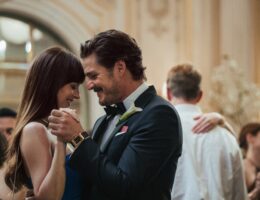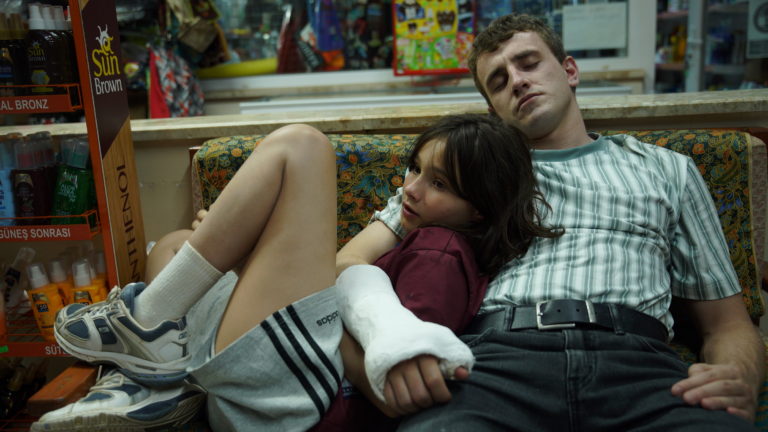Aftersun (2022 | UK | 98 minutes | Charlotte Wells)
A pervasive sadness lingers around the corners of Aftersun, Charlotte Wells’s deeply accomplished recollection of a father-daughter summer holiday in Turkey. Most of the entrancing film plays out in memory as sleepless adult woman in a dark apartment, woken by the sounds of a restless baby offscreen, revisits digital minicam footage from her childhood vacation that’s perhaps become more meaningful in retrospect. It’s the 1990s and her young father Callum (Paul Mescal, surprisingly perfect for the role of Hot Single Dad) has taken her to a nice-enough resort to cap her school holidays. We follow the concrete handheld footage into something of a lucid reconstruction of their time together, as reconstructed the vantage of new motherhood. Occasionally, the dreamy realism of memory is punctuated by stroboscopic scenes in a (possibly) imagined club depicting adult Sophie (maybe) recognizing her father’s dance moves in the crowd.
Mescal plays Calum, on the verge of his thirty-second birthday, as a supremely competent and sensitive young father to a recently-eleven-year-old daughter (a remarkably poised debut from Frankie Corio, a dead-ringer for the director). He’s separated from her mother on apparently amicable terms. Having moved away, he’s not in her life as much as either would like, but they have an easy and natural rapport.
They spend days by the pool under crystal clear blue skies dotted with drifting parasailers, snap photos of each other underwater, pal up for snorkeling day trips where tiny fish swim just below the surface, and have dinners together at the resort. Amid these parental bonding events, Sophie also experiences the beginnings of a chaste romance with a boy she meets at the arcade and dips her toes into the more sophisticated waters of teen rebellion when she’s welcomed into a clique of older kids at the pool tables. Both of them are at turning points in their lives, potentially on the verge of big changes, though the dawning of her adolescence is perhaps more obvious.
Through all these activities, you hold your breath waiting for something monumental to happen to justify the breathless hype out of its festival debut, but it’s just not that kind of movie. Aside from a few logistical bumps along the way and the resort being slightly less posh than he expected, the trip itself plays out — at least in memory — as some approximation of an ideal getaway. The film is fluidly and dexterously woven together by editor Blair McClendon, whose triumphant work pulls fragments of recollection and imagination together with exceptional pacing. It feels like being on vacation, with days both stretching out forever and the end always looming on the horizon. There’s a subtle genius to the way that the 90s-evoking video clips contrast the maturity that adult Sophie grants herself in memory with the more innocent, less polished child captured in her own handheld recordings. For instance, in the grainy overexposed clip that opens the film, she tries to interview her dad about what he imagined for himself at her age and he just can’t answer. While the framing and tone suggest an anticipation for something to go very wrong, we never get to see what it is. The power of the film is in how it avoids sentimental melodrama in favor of an implied mystery that Wells steadfastly refuses to explain.
Like adult Sophie, we find ourself eagerly searching the corners of her memory for clues. Callum’s moods are rarely erratic when they’re together, but oddities and possible hints of sadness hover at the edge of the frame. An early long shot finds him smoking alone on the balcony to the gentle sounds of his sleeping daughter’s breaths. He begins the trip wearing a cast over a wrist that he can’t remember breaking. He does occasional Tai-Chi practice and embarrasses his daughter with silly dance moves (it’s an A24 release, so expect a meaningful dance scene or two set to an impeccable 1990s soundtrack). Although he’s still on good terms with Sophie’s mom, he expresses a certainty that he’ll never return to their hometown. His mood occasionally flags, one night he opts out of karaoke, goes up to the room early and forgets to give Sophie the key. Slight lapses or curiosities that could easily be waved away, yet the film’s mood heightens each with the intense sense of detective work of an adult voraciously reinterpreting childhood memories and filling-in the blanks with world-weary perspective and an implied sense of loss.
The achievement is both in the performances by Mescal and Corio as well as the exceptional editing that interweaves these recollections. Mescal easily slides into the role of a young father, unsettled in life while striving to project confidence, with introspective grace. We’re in Sophie’s memories, which Corio navigates with an empathetic performance and small hints of wisdom and poise beyond her years. Some will certainly be frustrated by the lack of direct resolutions or unveiled explanations, but for me the elliptical nature of puzzling together memories, faded artifacts, and imagination made for a deeply evocative experience that will nag at the heart for quite some time.
A previous version of this review ran as part of our coverage of the the Telluride Film Festival, where the film’s producer Barry Jenkins was discombobulated after seeing it himself for the sixth time. Now you can see Aftersun in local theaters beginning November 4th.
Header image courtesy A24.




